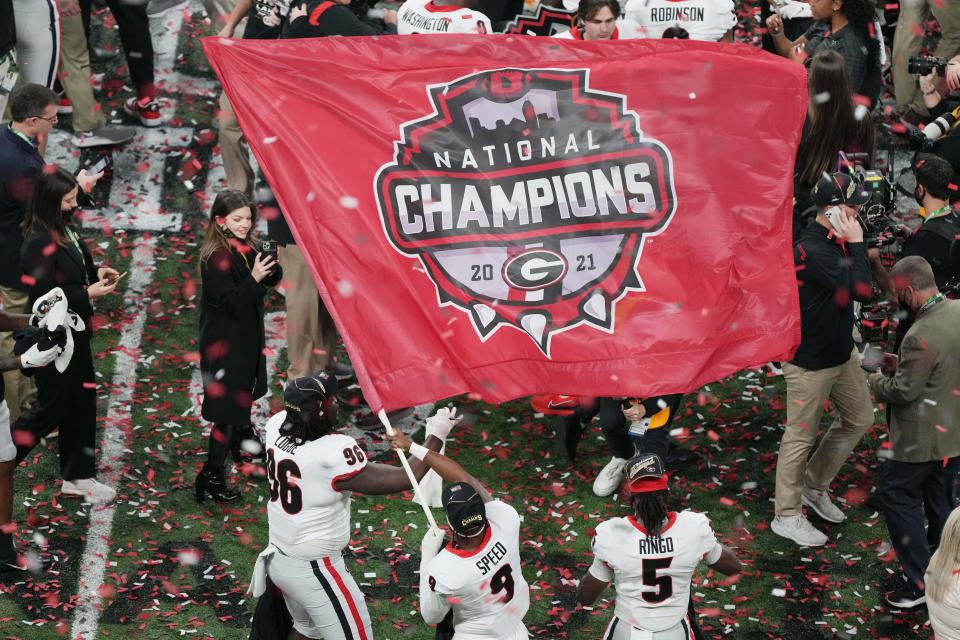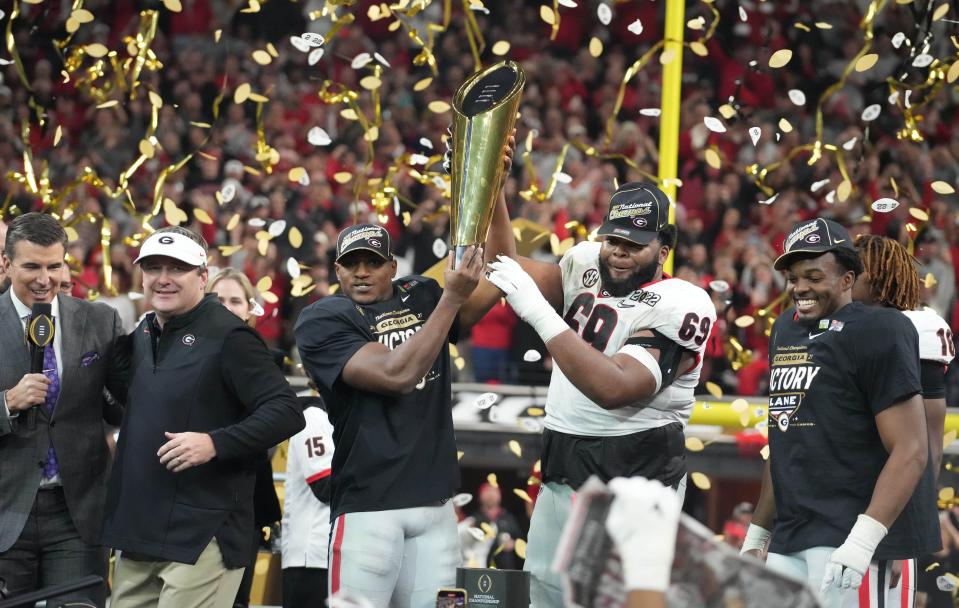College Football Playoff needs to slow athletic arms race | Opinion
With Georgia having just been crowned the College Football Playoff champion, the news has quickly shifted to looking at how soon and how much the marquee championship event will expand.
That’s the wrong debate to be having now.
Before the College Football Playoff expands, and before it renegotiates a media contract that could push total revenues up to $2 billion – revenues that will far surpass even those of March Madness – the playoff should first reform itself.
Put simply, the playoff should require that most of its revenue be earmarked, for the first time, to specifically advance athlete health, safety and education.
Expansion without reform will worsen the badly skewed priorities of big-revenue football – where exorbitant salaries and multimillion-dollar buyouts for Football Bowl Subdivision (FBS) coaches are only the most glaring symptoms of a warped financial model that places a premium on spending for competitive advantage.
Where does the money go?
The College Football Playoff's unwillingness to take responsibility for athlete well-being remains one of the great unreported stories in all of college sports.
More: Michigan State athletics signs landmark partnership with Caesars Sportsbook
More: Mitch Albom: Santa already paid his visit to college athletes this year
That story is routinely missed for two reasons: First, a lack of transparency by the College Football Playoff makes it difficult to “follow the money.” And second, there's a widespread but mistaken belief that the NCAA oversees the playoffs. In fact, the College Football Playoff is operated through an LLC, entirely independent of the NCAA, and controlled by a small group of FBS university presidents and FBS conference commissioners.

Surprisingly, the NCAA receives no money from the College Football Playoff, or from any FBS football revenue source, even though the NCAA pays for the national operations costs for FBS football.
For example, the NCAA pays for costly FBS football-related litigation, including lawsuits filed by former athletes who suffered injuries and illnesses.
The College Football Playoff does not directly allocate a dime to cover the national costs of athlete health and safety, despite high rates of concussions among football players.
By contrast, the NCAA’s March Madness tournament bears the national costs of FBS concussion research, catastrophic insurance and the development of game rules to protect players.
So where does the nearly $500 million annual net revenue currently generated by the College Football Playoff go? Roughly 80% goes to the 64 schools in the ACC, Big Ten, Pac-12, Big 12 and SEC (the “Power 5”), plus the independent Notre Dame, with no strings attached.
Conferences and institutions can divvy up the money however they see fit.
Since 2014-2015 season, when the CFP began, increased revenues have gone disproportionately to football coaching salaries, which have grown at a rate nearly triple that of scholarships and other institutional financial benefits to athletes at Power 5 schools.

This inequity is getting worse. In the 2021 season alone, eight Power 5 schools dished out more than $90 million in “dead money” to buy out their head football coaches’ contracts.
Three Power 5 schools recently escalated coaching salaries, paying their head football coaches roughly $95 million over 10 years, or $9.5 million a year.
At one of those schools, the head coach’s annual salary could pay for 111 assistant professors, every year, for a decade, according to The Chronicle of Higher Education.
College Football Playoff reform should slow, not accelerate the athletic arms race. The Knight Commission on Intercollegiate Athletics, an independent group on which we serve, recently proposed a new framework, Connecting Athletics Revenues with the Educational Model of College Sports (C.A.R.E. model) that would be a good start towards reform. The model would require that the College Football Playoff earmark money for athlete health, safety and education. And it would mandate much-needed financial transparency by requiring disclosure and would include athletes in independent oversight of the College Football Playoff.
Division I leaders understand that the incentives and spending of more than $3 billion of total shared revenues among FBS schools must be overhauled. That’s why 21 coaches’ associations, representing more than 30 men’s and women’s college sports and more than 84,000 Division I athletes, have already endorsed the C.A.R.E. proposal.
Pushing for reform
The NCAA also can push the College Football Playoff to reform itself by refusing to cover national costs for FBS football, since the NCAA doesn’t control the sport’s national championship (as it does for all of its 90 sponsored sports) or receive any related revenues.
University presidents and college sports leaders are currently rewriting the NCAA Constitution with a stated goal to “align authority and responsibility.”
The failure of both the NCAA and the College Football Playoff to address the misaligned authority and responsibility for FBS football puts at risk the financial stability of college sports for more than 1,000 schools and some 460,000 athletes.
The College Football Playoff's decisions on playoff size and its distribution of multimillion-dollar revenues ultimately affect all of college athletics. The College Football Playoff may soon manage the most lucrative championship in college sports. It should stop pretending that it’s just an event management entity and implement standards of accountability to promote athlete health, safety and education.
Arne Duncan is a former U.S. secretary of Education and Division I basketball player. Jacques McClendon, the director of football affairs for the Los Angeles Rams, played football for the University of Tennessee. Both serve on the Knight Commission on Intercollegiate Athletics.
This article originally appeared on USA TODAY: Spend college football playoff revenue on athletes' health | Opinion

